Ted Rabinowitz's Blog, page 10
March 24, 2016
In Which the Washington Post Proves That "Futurist" Is a Title Without Meaning
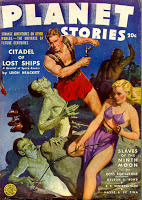 A friend on Facebook asked me what I thought of this article in the Washington Post. The thesis of the article was that Disney's commitment to Star Wars franchising, after building its empire on fantasy properties like Sleeping Beauty and The Little Mermaid, showed how science fiction was "eating the world."
A friend on Facebook asked me what I thought of this article in the Washington Post. The thesis of the article was that Disney's commitment to Star Wars franchising, after building its empire on fantasy properties like Sleeping Beauty and The Little Mermaid, showed how science fiction was "eating the world."I'm afraid my response was...a tad negative:
I think the author, despite his title as "futurist," doesn't know what science fiction is, doesn't know what fantasy is, doesn't understand the distinction between science fiction and space opera, and doesn't understand the dynamics driving the increase in female participation in fan culture.
So, not much wiggle room there. But let me expand a little.
A lot of people out there think that anything with starships and laser guns is science fiction, and that fantasy is either fairy tale princesses, Gandalf, or Harry Potter. Mr. Basulto is clearly one of these people. They're all wrong.
Science fiction - the real stuff, "hard" or "soft" - isn't about technology. It's about our reaction to technology. Specifically, to changes in technology. And to new scientific discoveries. And to changes in our universe. In short, science fiction is about our reaction to the new. The classic formulation of science fiction is "What if?" What if workers were replaced by mechanical men (Karl Çapek's RUR)? What if we had an electricity generating station that was so powerful we were economically dependent on it, but so dangerous that it could destroy us at any time (Robert Heinlein's Blowups Happen)? What if human beings who lived on a world with six suns finally saw darkness (Isaac Asimov's Nightfall)? How would we react? What would happen next?
"But wait!" I hear you cry, "What about Star Wars? That's science fiction! Where's the 'what if' there?" Well, hold on to your hat, fanboy. Star Wars isn't science fiction. Don't get me wrong; I like Star Wars (well, Star Wars IV, V and parts of VI, anyway). But it isn't science fiction. It is a future without extrapolation; it is technology without scientific rationale. We don't call this science fiction; we call it space opera.
Space opera is a fine thing. I loves it. But it is a subgenre in which technology is made to serve the storytelling functions of some other genre trope.
Space opera can be fantasy. What is a light saber but a magic sword?
Space opera can be naval warfare - consider Federation and Romulan starships playing destroyer vs. submarine in ST:TOS "The Balance of Terror."
Space opera can be superhero tales - sagas where the heroes are..um.."evolved" humans. Slan. The Rowan.
But space opera doesn't question technology or science; it uses them in place of something else. And personalities and ways of life remain unchanged, or hark back to an earlier time and place.
Published on March 24, 2016 12:02
March 17, 2016
What You Didn't Know About St. Patrick
1. Pat was a Fifth Century Romano-Brit. Kidnapped by Irish pirates, he was a slave in Ireland for six years before he got his revenge by converting the Irish to Christianity.
2. When they say Pat drove the "snakes" out of Ireland, that could be code for "druids." I don't know why.
 Here's a Snake
Here's a Snake
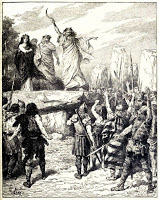 Here's a DruidNot getting it.
Here's a DruidNot getting it.
3. In New York City, most people who celebrate SPD are not actually Irish; they are from New Jersey.
4. St. Patrick's Breastplate is a Gaelic prayer that was supposed to have concealed St. Patrick and his monks from their enemies.
5. Dude named Palladius might be the real St. Patrick. Or maybe not. The deeds of the two might have been conflated. Happened a long, long time ago, y'all.
6. Although St. Patrick's Day is celebrated with parades throughout North America, there is no historical evidence that St. Patrick himself ever participated in one.
2. When they say Pat drove the "snakes" out of Ireland, that could be code for "druids." I don't know why.
 Here's a Snake
Here's a Snake Here's a DruidNot getting it.
Here's a DruidNot getting it.3. In New York City, most people who celebrate SPD are not actually Irish; they are from New Jersey.
4. St. Patrick's Breastplate is a Gaelic prayer that was supposed to have concealed St. Patrick and his monks from their enemies.
5. Dude named Palladius might be the real St. Patrick. Or maybe not. The deeds of the two might have been conflated. Happened a long, long time ago, y'all.
6. Although St. Patrick's Day is celebrated with parades throughout North America, there is no historical evidence that St. Patrick himself ever participated in one.
Published on March 17, 2016 17:24
March 14, 2016
FREE! Great Science Fiction and Fantasy Stories!
 Yep, you heard that right.
Yep, you heard that right.Until March 31, you can download an entire book filled with the best stories from 2014 and 2015 of new F/SF writers who are just breaking in. Want to know which books to buy in 2018? Start your research now.
For FREE!
So don't say I never give you nothin'. Just don't.
Published on March 14, 2016 10:06
Great Science Fiction and Fantasy Stories! FREE!
 Yep, you heard that right.
Yep, you heard that right.Until March 31, you can download an entire book filled with the best stories from 2014 and 2015 of new F/SF writers who are just breaking in. Want to know which books to buy in 2018? Start your research now.
For FREE!
So don't say I never give you nothin'. Just don't.
Published on March 14, 2016 10:06
March 12, 2016
Medieval Recipe Day: Bread!
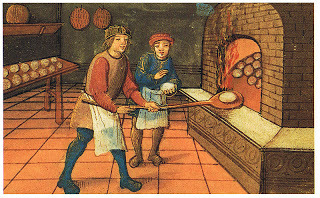 Bread was a big, big deal in the medieval European diet. The Europeans weren't alone in history, of course - Jesus was fond of it too ("Give us this day our daily bread") and for Jews, bread occupies a place just below wine as a ritual food - both are considered necessities for a Sabbath/holiday meal.
Bread was a big, big deal in the medieval European diet. The Europeans weren't alone in history, of course - Jesus was fond of it too ("Give us this day our daily bread") and for Jews, bread occupies a place just below wine as a ritual food - both are considered necessities for a Sabbath/holiday meal.Nobility preferred tasty white breads made of highly sifted wheat; commoners made do with darker breads. Ironically, the peasants' breads were probably more nutritious, with a wider variety of grains and even legumes and other veggies baked in. (Imagine you're a poor housewife, and you have a double handful of last year's dried peas to get rid of. Add them to the grain that you hand the miller to be ground into flour and bake it into your bread...)
Unfortunately, because bread was *so* common and such a staple, and (maybe) because so much of it was baked by guild bakers, instead of in the home (heat sources big and hot enough to bake fine loaves weren't as common as they are today) there are relatively few bread recipes from that period.
In fact, one of the few types of bread made in the average commoner's home, instead of by a baker, involved putting the dough in an overturned pot in the embers of the fire lit on the flat rock that was the single source of heat for the entire hut. Unleavened oatcakes were another staple. We do know that there were a lot of varieties of bread. Honey was often used as a sweetener, and ale (perhaps as a fermenting agent?). A cross was often cut into the top of the loaf.
Here's a recipe for barley bread that was probably a big hit among the monks of the day.
Published on March 12, 2016 09:18
March 9, 2016
Rules for Favors
 Last week I met someone who is making a documentary. Let's call her...Pina. Pina is smart, talented, and as soon as she heard about my Old Life in Film, she said "Oh, I have to get you onto my project." And I smiled a noncommittal smile...
Last week I met someone who is making a documentary. Let's call her...Pina. Pina is smart, talented, and as soon as she heard about my Old Life in Film, she said "Oh, I have to get you onto my project." And I smiled a noncommittal smile...Now I have no problem doing favors, especially when they involve me doing something new, like editing. I haven't edited film since the 20th Century, and I have never edited documentaries, so that would be exciting. Yay, new!
However, I've also done a lot of favors for people who never reciprocated. One time, the favor was three hours of story consultation - for free - for an actor/producer/director who was having trouble with the screenplay for her comedy. (If you're curious, take a look at the fees SCs charge.) She used my suggestions and made her film much better. She didn't give me a story credit; heck, she didn't even thank me in her "thank you" speech.
My problem then - now, not so much - was how much I wanted to be liked. Wanted, frankly, to be wanted. And what I didn't realize at the time was that there are a lot of people out there who see friendliness and helpfulness as the marks of the sucker. So to protect myself, I developed rules for favors. And since I believe that a lot of folks out there have the same issues I do, here are some of them.
Rule #1: Not an Employee.
If I'm doing you a favor, you're entitled to expect me to keep my word. If I say I'll show up at nine and work for eight hours, you're entitled to be pissed if I don't. However, for those hours, you are not my boss, and I am not your employee. You're not entitled to schedule my work breaks, bark orders at me, or ask me to take a drug test.
Pina wanted me to sign a non-disclosure agreement before I did her a favor. Of course, the easier way to keep the secret is I don't help at all.
Rule #2: Favors Are Reciprocal.
If I haven't known you long enough to be sure that you will help me just as I have helped you, then I ain't gonna help you.
It's a character judgment. As you get older, it gets easier to make. (One hopes.) And if you are bringing up serious free work with someone you've just met, then my little voice tells me that you don't yet understand reciprocity.
Rule #3: Life Is Too Short To Spend With the Miserable.
No matter how interesting the project or how talented the crew, if the asker seems unhappy, tired, angry, or just plain depressed, the best thing to do is walk away. I have enough problems of my own; if I have to deal with yours as well...then pay me.
So, there we go - simple rules. There are more, but those are enough to start, surely.
Published on March 09, 2016 14:03
March 5, 2016
Ah, The Sandman Adaptation
So, it seems that Joseph Gordon-Levitt is departing from the Sandman project. The Churn continues...par for the course for a literary property with an enormous, and well-deserved, reputation. Ask Hollywood folks how long the Dune and Stars My Destination adaptations went on...
Published on March 05, 2016 18:21
Medieval Recipe Day: Let's Make a Cretone of New Peas!
What's a cretone, you ask? This is.
Take some new peas. (Baby peas, perhaps? I think the point is that they're sweet, small, and not yet too starchy.)
 Fritters. Not fried pea fritters, but still-Cook them into mush. Drain the mush. And then - I love this part - fry it in lard. I think we're talking the medieval equivalent of refried beans...or, it's a fritter!
Fritters. Not fried pea fritters, but still-Cook them into mush. Drain the mush. And then - I love this part - fry it in lard. I think we're talking the medieval equivalent of refried beans...or, it's a fritter!
Next, boil some milk for just a moment, and soak the bread in the milk. The original recipe specifies cow's milk, which tells us that things like goat milk and almond milk were a lot more popular then. I suspect that the "bread" that's mentioned is the fried-pea mush, which isn't mentioned by name again.
Now that that's done, here's the sizzle: Crush up ginger and saffron, steep them in the milk, and boil. Cook chickens in water, quarter them, fry them, and add them to the milk to boil. Then put it all to "the back of the fire" and thread in egg yolks.
Now, the most important bit:If you actually try this at home, let me know how it turns out.
BTW - As is usually the case, this medieval recipe is brought to you by "Le Viandier" of Taillevent.
Take some new peas. (Baby peas, perhaps? I think the point is that they're sweet, small, and not yet too starchy.)
 Fritters. Not fried pea fritters, but still-Cook them into mush. Drain the mush. And then - I love this part - fry it in lard. I think we're talking the medieval equivalent of refried beans...or, it's a fritter!
Fritters. Not fried pea fritters, but still-Cook them into mush. Drain the mush. And then - I love this part - fry it in lard. I think we're talking the medieval equivalent of refried beans...or, it's a fritter!Next, boil some milk for just a moment, and soak the bread in the milk. The original recipe specifies cow's milk, which tells us that things like goat milk and almond milk were a lot more popular then. I suspect that the "bread" that's mentioned is the fried-pea mush, which isn't mentioned by name again.
Now that that's done, here's the sizzle: Crush up ginger and saffron, steep them in the milk, and boil. Cook chickens in water, quarter them, fry them, and add them to the milk to boil. Then put it all to "the back of the fire" and thread in egg yolks.
Now, the most important bit:If you actually try this at home, let me know how it turns out.
BTW - As is usually the case, this medieval recipe is brought to you by "Le Viandier" of Taillevent.
Published on March 05, 2016 15:59
February 29, 2016
Here's What Happens When You Have Story Problems
 I've written before about The Expanse, and now I've stopped watching. I didn't make it to the season finale.
I've written before about The Expanse, and now I've stopped watching. I didn't make it to the season finale.Story problems kill shows, but they're subtle. If everything else is okay - the visuals, the science, and most especially the performances - then questions of theme and character, tiny fundamental miscues, take a while to sink the show. They're like cracks in the foundation: less then a millimeter wide, but more than enough.
And that's the problem here. Syfy got all the flashbang-geewhiz right (well, except for the Belter physique thing) but they messed with Corey's characters in small but important ways. In the books, these characters are no-nonsense professionals up against something that's utterly beyond their competence. On TV, they're too often pouting juveniles. And somehow the TV writers found ways to suck all the juice out of some of the most serious backstory (such as Amos' childhood) and turn it into flat talking-head exposition. When I heard that an upcoming episode was a flashback to the life of a character who dies in the first episode, I gave up.
I bear the series no ill-will. I'll probably give it another try. It didn't insult my intelligence (unlike some Syfy offerings). And I'm vividly aware that I am not a TV writer, so I don't know if I would do any better. But still, I had such high hopes.
Published on February 29, 2016 15:24
February 24, 2016
More Rainy Day Recommendations!
 Creatures of Light and Darkness - I frequently recommend Roger Zelazny's books Lord of Light and Jack of Shadows. But if you're looking for something trippy and experimental, as well as being a deeply entertaining riff on Egyptian mythology, COLAD is worth more than a look. Zelazny originally wrote it as a narrative experiment. Then Sam Delany saw it, took it to a publisher, and the rest is mythology.
Creatures of Light and Darkness - I frequently recommend Roger Zelazny's books Lord of Light and Jack of Shadows. But if you're looking for something trippy and experimental, as well as being a deeply entertaining riff on Egyptian mythology, COLAD is worth more than a look. Zelazny originally wrote it as a narrative experiment. Then Sam Delany saw it, took it to a publisher, and the rest is mythology.Startide Rising - The best in David Brin's Uplift Wars novels, SR follows the adventures of a dolphin/human starship crew stranded on a deadly world as an interstellar war rages over their heads. Great extrapolation of how technologically advanced cetaceans might act and think; brilliantly realized extraterrestrials; and a believable planetary environment, thanks in part to Brin's background as an astrophysicist. Also a lot of rip-roarin' action.
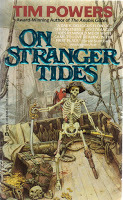
On Stranger Tides - Pay no attention to Disney's use of the title for the POTC franchise. On Stranger Tides is vintage Tim Powers: a deeply weird, deeply logical, deeply occult and well researched take on pirates, voodoo, and the fountain of youth. It also moves faster than a gunboat under full sail.
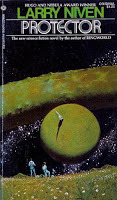 Protector - Larry Niven's SF explanation of the nature of old age and human evolution. Overtaken by current discoveries in the human genome and the fossil record, but still a lot of fun, with a great space battle between two STL starships orbiting a dwarf star.
Protector - Larry Niven's SF explanation of the nature of old age and human evolution. Overtaken by current discoveries in the human genome and the fossil record, but still a lot of fun, with a great space battle between two STL starships orbiting a dwarf star.
Published on February 24, 2016 13:59



